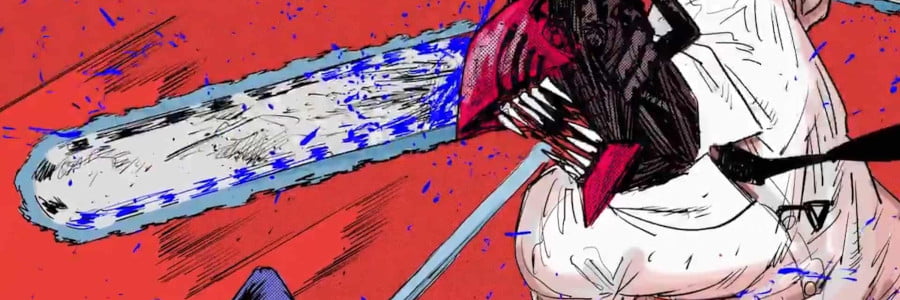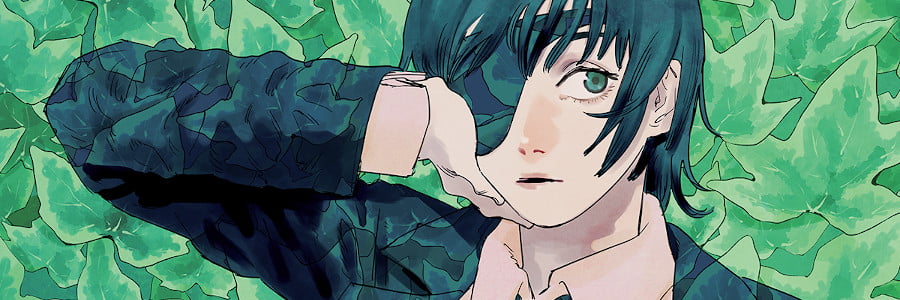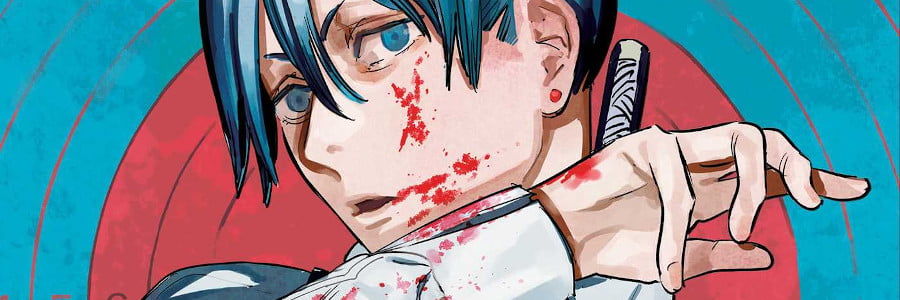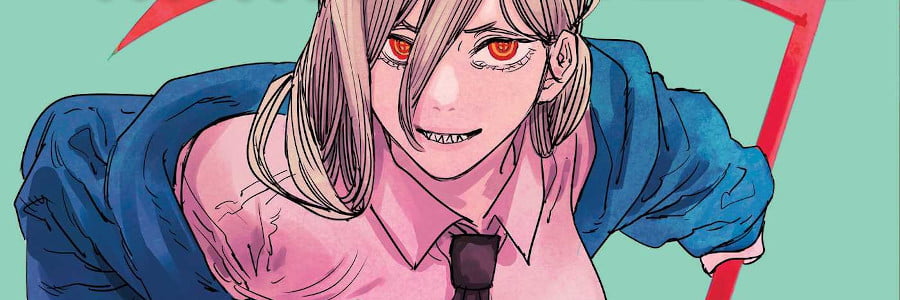I don’t like when my writing on a subject resembles someone else’s too much. I feel a little bit like I’m really just better off providing a link to the other person’s writing. In this case, it’s Geoff Thew, of Mother’s Basement, who made an entire video with a comedic tone framed around You Have To Read Chainsaw Man. I watched that, I saw his description of Power as a mix between Walter Sobchak and Eric Cartman and went ‘well, I need to know what the hell he’s talking about, there’s no way this character actually delivers on that.’ And then I read it, and I shared pages with my friends and they went and read it and I was left with the frustrating impression that Thew pretty much hit on the perfect gimmick for this kind of article.
Holy crap, Chainsaw Man is really good.
I want to talk more about Chainsaw Man, but I don’t intend to ‘spoil’ it much. There’s not a lot of reason to talk about it in the context of specific incident or ideas, but rather about its tone and style, and why I think I like it so much. That said, this is definitely ‘content warning-y.’
Just a list off the top of my head, then. Content warning for extensive graphic violence, eye trauma, a lot of talk about guns and their importance, alcohol consumption, throwing up, puppeteering, implied child endangerment (sexual), actual child endangerment, blood all over the place, zombies, torture, cannibalism (both sudden and shocking, and slow and considered), existential horror, workplace anxiety, and it’s got a bunch of great characters in it, many of whom die abruptly.

Chainsaw Man is a 2018-2020 manga series from Weekly Shonen Jump, by Tatsuki Fujimoto. Viz Media are distributing it in English, and it’s being sold as eleven tankoubon volumes, which I will almost certainly be buying, but I intend to give it until after Christmas in case a surprisingly understanding family member wants to buy me a few volumes as a present. I for one would be surprised given that this manga has covers that look like, well, uh, it looks like a parody of gory horror manga with a central character covered in comedy blood colours who has chainsaws coming out of his arms and head.
Okay, premise stuff.
Denji No Surname is a poor son of a poorer parentage who was left with nothing but debt, born into a world full of demons. He’s sold organs (including an eye and a testicle) to try and pay it off, he works jobs at slavery wages, and basically eats trash and sleeps in an otherwise abandoned home, with his only friend, a demon dog named Pochita with a chainsaw for a nose. The world he’s in has real demons, which he fights and kills illegally with the help of Pochita, so his yakuza owners can sell the parts of the demon illegally.
Then one day, Denji gets betrayed by his handlers, who think they’ve extracted meaningful value out of him, and leave him to die. Pochita, his beloved friend, offers him a second chance at life, and he bursts out, as CHAINSAW MAN, tears through the demon that would have consumed him, and wrecks a warehouse full of things that were once human. Gasping and helpless, Denji collapses in the arms of a woman who offers him a job as a demon hunter.
As her dog.
And that’s your premise. Extraordinary circumstances, poor kid, late 90s, world is fucked and feels more fucked, and it’s used as a starting point for a gory, horrifying, high-impact action narrative about a dude who fights demons who has a chainsaw for hands.

The world he’s in is a world like ours; an alternate-history 1997, a near-to-now modern society with wage slavery and oppressive work, and there’s just also these near-random behaviour of brutal demons that show up and cause problems. In Japan, there are demon hunters, who show up and kill them and deal with them, a sort of business-suited super-emergency-response team. You know the metaphor, it’s possibly a kind of copaganda, but it’s a lot more like a sort of office job, in the cultural tone and style. People with access to demonic power use it, and people without it live in fear of that, in sometimes extremely random and cruel ways.
And look, I’m a millenial. I have spent the past twenty five years of my life being told that my generation, the youths, are wrecking everything. But I need to make absolutely sure I don’t buy into the simple sigh of this series, which is it’s about being born into a doomed world under endless debt that makes you feel like you’re just scraping by for the least you can, and say ‘oh, this is very millenial.’ It sure feels it, but I know that this is being reductive, and I want to highlight that the text is not a thing with an inherent value, even though it makes me feel that way.
Because it does feel that way.
It feels very millenial.
It’s about being a poor weirdo in the 90s whose found family and friends are composed entirely of associates you make out of trying to survive. People you struggle to connect to at first but once you have it, once you know them, they’re your family and you care for them and care about them. And when they’re gone, it hurts, it aches. Denji’s frame for these people isn’t a job – it’s about the life the job gives him afterwards, and what he wants to do with his life. There’s no need for greater purpose, because it’s important enough that he has even tomorrow.
It’s full of great characters; it’s full of really striking visual designs and people who are very good at evoking strong, painful reactions. That initial descriptor of Power – a character introduced early – as being ‘a mix of Walter Sobcheck and Eric Cartman?’ – is not only explicit (the author made the comparison), but she’s also fucking awesome.

This is also a very fleshy series. It is a series that is in my own parlance ‘made of meat.’ There’s a materiality to people, people who piss and shit and bleed and vomit and faint and sigh and listen and suffer. This can be a bit disruptive and a bit challenging, because it undeniably uses the way that Denji is horny for even modest improvements in his life (he does a surprising amount for the promise of being able to touch a boob) to drive the plot. But even then that’s part of the way the story builds itself around desperation and isolation. Denji behaves in a way that looks surreal if you’ve never been isolated from support, if you’ve never been without the idea of any alternatives. Most people these days live lives in a world which creates an enmeshed network of support, and those of us who have been deprived of those networks, who realise how absolutely bottomless things are without it, can resonate with what that means.
Denji’s behaviour is weird, unless you know what it’s like to feel that desperate.
It’s a brutal and beautiful series which uses its own format, the medium, exceptionally well, creates the illusion of status quos just long enough to break them into pieces, and uses a neverending sequence of oddity to create a deeply unreal feeling of horror. It’s excellent in all the ways I want this kind of thing to be excellent.
I think Chainsaw Man is great, and I recommend you check it out.
